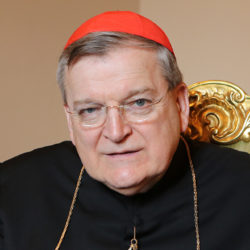Turning to the question on Islam, Cardinal Burke said he thinks “the response to Islam, at least as I see it on the part of some, is very much influenced by a relativism of a religious order. I hear people saying to me, well, we’re all worshiping the same God. We all believe in love. But I say stop a minute, and let’s examine carefully what Islam is, and what our Christian faith teaches us both. And when we come to the question of Christian faith, immediately there is involved a metaphysics because in the Christian faith God is the creator both of reason and he’s the giver of revelation, by which that what he teaches us, what the law is written on our hearts is illuminated, and we’re given a divine grace to live according to that law.
“This is not true in Islam,” he said. “I’ve been accused of taking an extreme view about Islam or of being influenced by people who don’t understand Islam, everything that I’ve said about Islam, including especially what’s in the book, is based on my own study of the text of Islam and also of their commentators, and when I’ve written on Islam I’ve been at pains to cite their own authors. And the point I wanted to come to is this, I don’t believe it’s true that we’re all worshiping the same God, because the God of Islam is a governor. In other words, fundamentally Islam is, Sharia is their law, and that law, which comes from Allah, must dominate every man eventually.
“And it’s not a law that’s founded on love. To say that we all believe in love is simply not correct. And while our experience may be with individual Muslims may be one of people who are gentle and kind and so forth, we have to understand that in the end what they believe most deeply, that to which they ascribe in their hearts, demands that they govern the world. Whereas, in the Christian faith we’re taught that by the development of right reason, by sound metaphysics, and then that which leads to faith and to the light and strength that’s given by faith, we make our contribution to society also in terms of its governance, but the Church makes no pretense that it’s to govern the world, but rather that it’s to inspire and assist those who govern the world to act justly and rightly toward the citizens.”
He believes relativism comes in the sense, “[W]e don’t respect the truth about what Islam teaches and what, for instance, the Catholic Church teaches, and we just make these general statements, we’re all believing in the same God and so forth, and this is not helpful and ultimately it will be the end of Christianity, meaning nothing has changed in the Islamic agenda from prior times in which our ancestors in the faith have had to fight to save Christianity. And why? Because they saw that Islam was attacking sacred truths, including the sacred places of our redemption.
“We have to have a profound respect for right reason, for the natural law which God has written in every human heart. I think most people don’t realize that there is no natural law doctrine in Islam and neither is there an ocean of conscience, everything is dictates of the laws that are given by either in their sacred text or by those who are entrusted with interpreting the law.”
Read more at National Catholic Register


No comments yet.